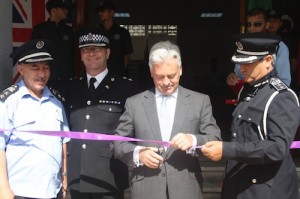By Libya Herald staff.

Tripoli, 24 June 2014:
British Minister of State for International Development Alan Duncan officiated the opening of newly refurbished . . .[restrict]training facilities and accommodation at the Police General Directorate of Training in Tripoli Monday. British Ambassador Michael Aron also attended the ceremony, along with Libyan police officers and members of the British Embassy staff.
The newly equipped training facility also includes 250 bed spaces, a restaurant and catering facilities and will be responsible for providing training for Libyan police officers.

Speaking about the cooperation between Libyan authorities and UK experts in developing the facility Duncan said that “the skills taught here will help the police to serve the Libyan people better and to address the very serious security challenges which they face.” He also affirmed the UK’s commitment to work with Libya to help them overcome these challenges and to “build a more stable, secure and democratic Libya over the coming months and years”.
The UK’s Security, Justice and Defence (SJD) programme in Libya is funded and overseen jointly by the UK Department for International Development, the Foreign and Commonwealth Office and the Ministry of Defence. Started in 2013, the programme will run until the end of 2017. According to the British, it is organised around national security, improving institutional capacity and enhancing operational capacity. They report they are working closely with Libyans to ensure that all activity is sustainable.
The programme is also coordinated with international partners such as the UN, the EU and key allies.
With a £62.6-million (LD 135-million) commitment over the next three and a half years, the UK says it is seeking to help the Libyan government strengthen the capability, accountability and responsiveness of its security, justice and defence sectors. In addition to the upgrades to the police training facilities, the UK has provided training in investigative techniques, alongside other specialist skills.
The SJD programme will also train up to 1,500 judicial police in prisoner protection and reorganise police command and service delivery within Tripoli. Furthermore, it will initiate a programme for securing munitions to help the Libyan government establish and secure at least six ammunition storage sites. Also, an extensive defence programme will be established within the Ministry of Defence and key military headquarters. This includes a 12-18 month programme to develop Libyan military operational planning capacity and support to the Libyan Border Guards.
While in Tripoli, Duncan also met with Prime Minister Abdullah Al-Thinni to discuss ways the UK could help on training and building up state institutions in Libya. [/restrict]








